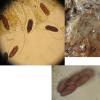
03-03-2026 20:34
 Miguel Ángel Ribes
Miguel Ángel Ribes
Good eveningThese small, amphora-shaped perithecia

01-03-2026 18:02
 Francois Guay
Francois Guay
I found this mystery Helotiales on an incubated le

28-02-2026 14:43
A new refrence desired :Svanidze, T.V. (1984) Novy

01-03-2026 18:46
 Robin Isaksson
Robin Isaksson
Hi! This species i se from time to time in the

27-02-2026 17:51
 Michel Hairaud
Michel Hairaud
Bonjour, Quelqu'un peut il me donner un conseil p

27-02-2026 16:17
 Mathias Hass
Mathias Hass
Hi, Found this on Betula, rather fresh fallen twi

01-03-2026 14:10
 Antonio Couceiro
Antonio Couceiro
Hola, me gustaria conocer opiniones sobre este tem
Saccobolus
M. M. Gotink,
02-06-2010 00:15
Apothecia very small (<500 µm), yellowish.
Asci 8-spored, 100-140 x 35-40 µm.
Spores in clusters of 4 rows of 2 longitudinally arranged spores (like Saccobolus glaber), clusters 45-48 x 15-17 µm, with a gelatinous sheet. Spores 18-20 x 8-9 µm, very finely warted and with some cracks.
Using Ellis&Ellis + Keys to fungi on dung only Saccobolus versicolor and S. citrinus seems to fit, but the first has the clusters arranged differently, and the latter has more obvious yellow colored aphotecia and more conspicuous warts on the spores.
But I just found a little bit information of Brummelen (1967), which seems to give smaller spore and cluster sizes for most species, this way S. glaber comes in sight again and another species: S. succineus.
Using some danish key which has all the said species I think it actually might be S. succineus. The pale color, cluster size, spore size and spore ornamentation all seem to fit.
But I would like a second opinion since I'm still very unsure due to all the different information and my unfamiliarity with Saccobolus...
Michel Delpont,
02-06-2010 14:35

Re:Saccobolus
Hello.
The genus Saccobolus is difficult; succineus and citrinus are close, but actually succineus spores have finer and denser warts, and darker color than citrinus which are more purple.
Michel.
The genus Saccobolus is difficult; succineus and citrinus are close, but actually succineus spores have finer and denser warts, and darker color than citrinus which are more purple.
Michel.
M. M. Gotink,
02-06-2010 19:00
Re:Saccobolus
Hi Michel,
The warts on my spores were very fine and dense, not like the warts of S. citrinus I've seen in the different keys. But the mature spores were clearly dark purple as you can see on my photo's...
Martin
The warts on my spores were very fine and dense, not like the warts of S. citrinus I've seen in the different keys. But the mature spores were clearly dark purple as you can see on my photo's...
Martin
Peter Welt,
02-06-2010 20:14

Re:Saccobolus
Hi Martin,
As Michel has already written is Saccobolus a very difficult race. There is, in my view, more open-ended questions such as questions clarified. In particular, the assessment of the spore cluster is not easy. The color of the spores and the very variable but surely ornament plays only a minor role. For me, this is, on the basis of spore size and color (yellow) Saccobolus citrinus.
Peter
As Michel has already written is Saccobolus a very difficult race. There is, in my view, more open-ended questions such as questions clarified. In particular, the assessment of the spore cluster is not easy. The color of the spores and the very variable but surely ornament plays only a minor role. For me, this is, on the basis of spore size and color (yellow) Saccobolus citrinus.
Peter
M. M. Gotink,
02-06-2010 21:49
Re:Saccobolus
Hi Peter,
Ok, I'll call it a Saccobolus cf. citrinus. Didn't expect Saccobolus to be this difficult in the beginning... Thanks.
Martin
Ok, I'll call it a Saccobolus cf. citrinus. Didn't expect Saccobolus to be this difficult in the beginning... Thanks.
Martin
